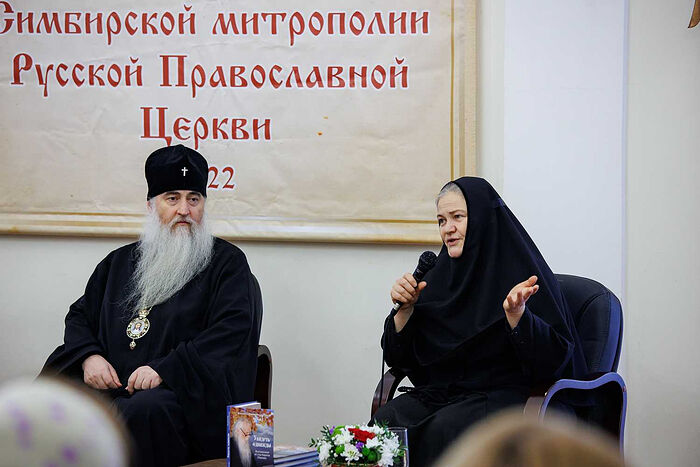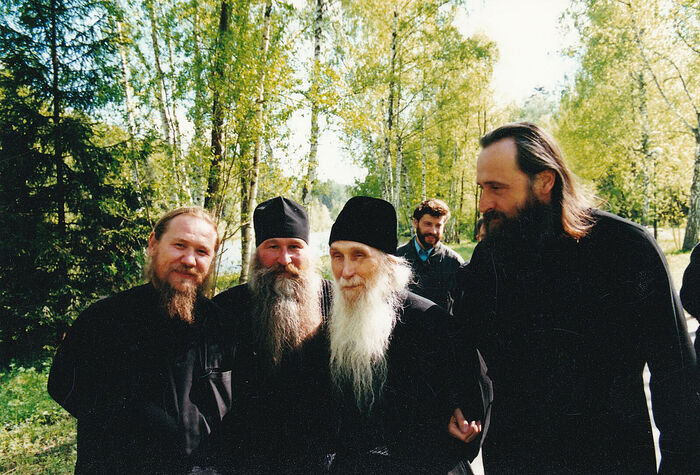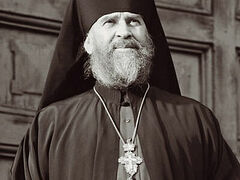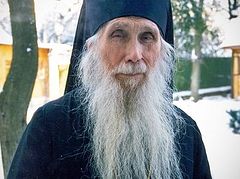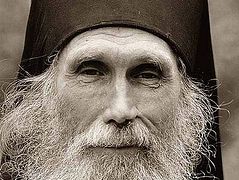 An evening in memory of Archimandrite Kirill (Pavlov) was held at the Ulyanovsk Book Palace— a meeting with Nun Evfimia (Aksamentova), the author of the books, My Heart Is with You... On the Sixtieth Anniversary of the Repose of the Venerable Raphael of Optina, Confessor; and To See Once. Memories of Father Kirill (Pavlov). Metropolitan Longin of Simbirsk and Novospasskoye took part in the meeting as well.
An evening in memory of Archimandrite Kirill (Pavlov) was held at the Ulyanovsk Book Palace— a meeting with Nun Evfimia (Aksamentova), the author of the books, My Heart Is with You... On the Sixtieth Anniversary of the Repose of the Venerable Raphael of Optina, Confessor; and To See Once. Memories of Father Kirill (Pavlov). Metropolitan Longin of Simbirsk and Novospasskoye took part in the meeting as well.
Nun Evfimia lives at the Stavropegic Convent of the Exaltation of the Holy Cross in Jerusalem. She spent almost two decades, beginning from her monastic youth, near Elder Kirill. Metropolitan Longin is from “St. Sergius’ nest”. The Holy Trinity-St. Sergius Lavra and its father-confessor Fr. Kirill had a huge impact on his life and his choice of the monastic path. The talk was dedicated to Fr. Kirill’s quiet service and his unforgettable lessons.
To see life according to the Gospel
—How did you first meet Fr. Kirill and how did he enter your life?
Metropolitan Longin:
—The Holy Trinity-St. Sergius Lavra is the heart of Russian Orthodoxy, and it was especially felt in the 1980s. On the territory of what is now the Russian Federation there were only two active monasteries: the Pskov-Caves Monastery, which was never closed because for some time it was on the territory of then independent Estonia, and the Holy Trinity-St. Sergius Lavra.
In 1985, when I came there, it was probably the most comfortable monastery both externally and internally. And it was filled with absolutely wonderful people. There were real monks there.
Monastic life, and Christian life in general, is something that is passed on by experience. What is the merit of St. Sergius, his spiritual children and the spiritual fathers of the Lavra, including Fr. Kirill? These people by their lives, without lofty words, without beautiful speeches and without voluminous writings showed people around them that the Gospel can be lived. And, seeing this life according to the Gospel, people became convinced of the truth of Christianity better than if they had read a huge library and listened to dozens of hours of wonderful, magnificent and profound speeches.
 Sisters with batiushka in Peredelkino
Sisters with batiushka in Peredelkino
At that time, a great many people flocked to Fr. Kirill—both the Lavra monks and students of the Moscow Theological Seminary and Academy, and laypeople from all over the country.
There were quite a lot of students in my time—around 700-800, And many of them had father-confessors in the Lavra. And, of course, Fr. Kirill had the most spiritual children. In addition to the fact that he was present at all services, he heard confessions in one of the chapels of the Refectory Church: from the beginning of the evening service until the very end when the last person left it. Although the service was over long ago, the confession continued... Batiushka heard the confessions of monastics and priests. In addition, he received laypeople in the so-called “parcel room” at the entrance to the Lavra, where ordinary people could come. Before the dinner the Lavra brethren would gather in his cell to read the monastic rule. And in the evening seminarians would come and he read the Holy Scriptures to them. They packed his cell like sardines in a can. Today I cannot even imagine how a person could live every day with such a routine. Nun Evfimia wrote quite a lot about this in her memoirs.
 The old building of the residence, where Fr. Kirill had a cell
The old building of the residence, where Fr. Kirill had a cell
For most of those who came to batiushka his most important teaching was the commandment to constantly read the Holy Scriptures. He himself set an example in this. According to St. Seraphim of Sarov, our mind should, as it were, swim in the Holy Scriptures so that we could coordinate every word, every deed and every movement of the soul with the Gospel. I think it was the case with Fr. Kirill.
Nun Evfimia:
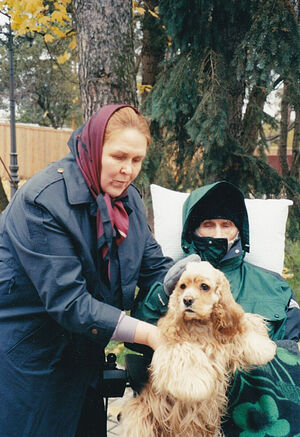 With assistant L.V. Pyankova and doggy Jonik —The town of Peredelkino near Moscow is a writers’ village that everyone knows; dachas and the old Transfiguration Church, with the Patriarchal residence adjoining the church. In 1990, we young sisters arrived there, mainly from Pyukhtitsa Convent—Patriarch Alexei II knew and loved Pyukhtitsa Convent from childhood, and it is completely understandable that he invited his first assistants to the place of his Patriarchal ministry from this convent. We arrived and did the usual women’s daily work, arranging the life there Some fed people and worked in the kitchen, others labored in the farmyard, others in the gardens. There were about eight of us sisters, and batiushka would come to the Patriarchal residence from time to time. That’s how we first met.
With assistant L.V. Pyankova and doggy Jonik —The town of Peredelkino near Moscow is a writers’ village that everyone knows; dachas and the old Transfiguration Church, with the Patriarchal residence adjoining the church. In 1990, we young sisters arrived there, mainly from Pyukhtitsa Convent—Patriarch Alexei II knew and loved Pyukhtitsa Convent from childhood, and it is completely understandable that he invited his first assistants to the place of his Patriarchal ministry from this convent. We arrived and did the usual women’s daily work, arranging the life there Some fed people and worked in the kitchen, others labored in the farmyard, others in the gardens. There were about eight of us sisters, and batiushka would come to the Patriarchal residence from time to time. That’s how we first met.
Fr. Kirill would visit Peredelkino under Patriarch Pimen as well. I think then this place was supervised by the Lavra brethren, right?
Metropolitan Longin:
—The fact is that at one time Patriarch Alexei (Simansky) asked Joseph Stalin for a dacha. Peredelkino was a village comprised of members of the Writers’ Union, and there, next to the church that was never closed, there were a couple of old buildings—the former estate of the boyars Kolychev, relatives of St. Philip of Moscow. So they were given to the Orthodox Church. The Transfiguration Church became a dependency of the Lavra, and the Lavra hieromonks served there. Patriarch Alexei I lived and died there. But Patriarch Pimen was somewhat indifferent to this place. He lived in Moscow, at Chisty Lane, and hardly ever travelled to Peredelkino.
Nun Evfimia:
—Yes, under Patriarch Pimen, Peredelkino was a place of rest for some senior brethren, but the Patriarch himself did not like to visit it. Fr. Kirill usually stayed in Peredelkino for a fortnight before Lent. Lent is a very busy time for the senior brethren and the father- confessors. And two weeks of rest were very helpful to batiushka.
In 1990, Alexei II was elected primate of the Russian Church. He came to love Peredelkino and chose it as his place of residence. And it was unclear whether it would be convenient for the elder to visit Peredelkino as before. However, His Holiness Alexei was well disposed towards Fr. Kirill and began to invite the elder to rest in the residence before Lent. At that time, after various medical operations, batiushka needed a place where he could recuperate. At the monastery the workload was superhuman, and Fr. Kirill could only escape for a short while to a more or less isolated place in order to recover. And Peredelkino became such a place.
 Peredelkino. The first years after his stroke Before his stroke [on December 4, 2003.—Trans.] Fr. Kirill had not needed the care of any cell-attendants. That is, neither at the monastery nor in Peredelkino was there such a cell-attendant who, for example, would hand the cassock to a “frail old man”, accompanying him everywhere. No! However, at the Lavra the brethren (there were many well-wishers) helped the elder with great joy, especially when he was surrounded by crowds of people... So he did not need cell-attendants in the usual sense. But still, both at the Lavra and in Peredelkino, at least someone was needed who would simply help him, for example, carry endless packages of presents for people. The distribution of gifts was one of the attributes of Fr. Kirill’s attitude to people. On the territory of the parish church adjacent to the residence there was a large baptistry where he received people. It was there that he had to take all the heavy gifts, such as books, icons and chocolates. Giving people treats was extremely important to Batiushka. Whenever some benefactor appeared, he was asked above all to donate to the elder something that he could please people with: sweets and church calendars (it was hard for ordinary people to get them back then, and Batiushka took it into account). All this was very relevant in the 1990s, when many people were starving; there were lots of dramatic life situations. This is how life went on in Peredelkino near the elder...
Peredelkino. The first years after his stroke Before his stroke [on December 4, 2003.—Trans.] Fr. Kirill had not needed the care of any cell-attendants. That is, neither at the monastery nor in Peredelkino was there such a cell-attendant who, for example, would hand the cassock to a “frail old man”, accompanying him everywhere. No! However, at the Lavra the brethren (there were many well-wishers) helped the elder with great joy, especially when he was surrounded by crowds of people... So he did not need cell-attendants in the usual sense. But still, both at the Lavra and in Peredelkino, at least someone was needed who would simply help him, for example, carry endless packages of presents for people. The distribution of gifts was one of the attributes of Fr. Kirill’s attitude to people. On the territory of the parish church adjacent to the residence there was a large baptistry where he received people. It was there that he had to take all the heavy gifts, such as books, icons and chocolates. Giving people treats was extremely important to Batiushka. Whenever some benefactor appeared, he was asked above all to donate to the elder something that he could please people with: sweets and church calendars (it was hard for ordinary people to get them back then, and Batiushka took it into account). All this was very relevant in the 1990s, when many people were starving; there were lots of dramatic life situations. This is how life went on in Peredelkino near the elder...
People go to father-confessors with problems
—What did people come to Fr. Kirill with?
Nun Evfimia:
—In the 1990s, as we remember, everything changed in the country. Monasteries and parish churches were being returned to the Russian Church, and Church life was being revived. A steady stream of monastics went to the elder: they were starting everything from scratch and needed the advice of an experienced spiritual father. Laypeople also came with their misfortunes and serious problems. People in trouble, first of all, come to the Church, turning to clergy for help. So the scope of experiences that befell Fr. Kirill and other father-confessors of that period was colossal. None of them spared themselves.
After all, Batiushka lived till about ninety-eight—a very long life. And what times he saw! The period of collectivization, then the war, then post-war life in a country with an anti-religious ideology, then the disintegration of the Soviet Union, the “crazy” 1990s... That is, whatever period you take, it was very difficult, and there was no time for a conscientious person to pity himself. We didn’t live for ourselves, but for others. Then I never stopped wondering where Fr. Kirill got the strength for his great labors...
Of course, the Lord helped His faithful disciple.
—And he had to accept everyone into his heart, consoling them and giving them spiritual advice?
Nun Evfimia:
— Yes, people sought his advice. And they had many problems; they needed diverse advice. The elder gave them advice with much discretion and love, praying to God for enlightenment... It was impossible to cover such a multitude of requests and problems with the human mind alone.
Metropolitan Longin:
—In those years I was charged with the task of restoring the dependency of the Holy Trinity-St. Sergius Lavra in Moscow, and I remember this time well. Maybe someone will argue: “What was there to restore in Moscow?” But in 1992, when I was blessed to serve as head of the dependency, I protested greatly.
They appointed me the head against my will, and I did not want to leave the Lavra. I had just returned from Bulgaria after finishing my studies, and I was happy in my tiny cell of the Lavra. There was an assistant to the steward, and I didn’t need anything else. When they said that the steward had such plans for me, I was indignant that they were again “kicking me out of the monastery”.
 At the Dependency of the Lavra I told the steward, the current abbot of Valaam Monastery, that I did not agree and that I would go to Batiushka and say that I refused. He answered: “The abbot and I will go to Batiushka before you.” Then there was the refectory on the first story of the brethren’s building, and on the second—batiushka’s cell. Thus, before dinner, while I was going up to him in confusion, batiushka and the abbot were coming down to meet me. Batiushka saw me and smiled: “Oh, the head of the dependency is coming!” I was very hurt and annoyed. But it couldn’t be helped, so I had to obey.
At the Dependency of the Lavra I told the steward, the current abbot of Valaam Monastery, that I did not agree and that I would go to Batiushka and say that I refused. He answered: “The abbot and I will go to Batiushka before you.” Then there was the refectory on the first story of the brethren’s building, and on the second—batiushka’s cell. Thus, before dinner, while I was going up to him in confusion, batiushka and the abbot were coming down to meet me. Batiushka saw me and smiled: “Oh, the head of the dependency is coming!” I was very hurt and annoyed. But it couldn’t be helped, so I had to obey.
Moscow at that time was very different from what it is now. On the site of the dependency, although it was the city center, there was a huge garbage heap that had not been taken out for probably two years. And below, on the road opposite the church, stood the shell of a burned-out trolleybus. It stood there for a whole year. In the evening it was dark, dirty and scary there. Of course, there was nothing like today’s splendid, flourishing and rich Moscow.
But it was very important for us that Batiushka took an active part in our lives. I arrived there alone, and then gradually the brethren began to gather around. From the very beginning I wanted it to be not just a Moscow parish subordinate to the Holy Trinity-St. Sergius Lavra, but a real, albeit small, monastic community—although there were no special conditions for this. But we somewhat succeeded, and in the eleven years that I served there eighteen people gathered. Many of the brethren often travelled to Batiushka and consulted with him. I myself consulted with him on all the main questions that concerned the dependency’s future. He visited us a number of times and participated in the great consecration of the revived Holy Trinity Church. So were also closely connected with him and in many ways lived with his blessing.
—Mother Evfimia, how did Fr. Kirill behave with different people? Was there a special feature in his behavior?
Nun Evfimia:
—He was simple and respectful to everyone. He was not deferential to the powers that be or disdainful of simple people.
I now recall my life and the mistakes I made at the beginning of my monastic path. Then I had no idea at all about what spiritual life is like and how to communicate with people (even with people like Fr. Kirill). And I realized that he always treated us better than we deserved. I am not speaking only about myself. By and large, we are not worthy of special praise and we do not shine with virtue. But the elder treated us better than we deserved, lovingly healing our weaknesses and shortcomings—and this stimulated our growth and gave us hope, especially if we were prone to despondency. For example, I was not brought up in the faith and my childhood was not spent in the Church. Hence, from my lack of knowledge of Christian morality and ethics, and a damaged perception of reality common in my generation, we had complicated mental states, complex psychological (as they would say now) problems, and were susceptible to despondency and depression. This is familiar to many of my peers. And when you find yourself face to face with a spiritual, holy man, and he treats you with love and motherly tenderness, instilling in you gratitude to God and faith in your ability to improve, it is worth a great deal.
If the Gospel sounds inside you, you will hear the will of God
—I can’t but ask this question. Perhaps every person in his life dreams of meeting an elder, communicating with an elder. What is the difference between a real elder and an old man of monastic rank? Who was Fr. Kirill? As far as I know, he did not consider himself an elder.
Nun Evfimia:
—Yes, his modesty and meekness seemed to walk ahead of him. This can be confirmed by everyone who knew Batiushka. It always struck us in him. For me it has become a criterion for how to look at the world and people. Where there is this meek spirit, there is truth. And if there is not this spirit, you already look at a situation a little critically. By the way, there is nothing wrong with this, to look critically at a situation. We must learn to think critically and talk about what is happening around us and in ourselves. And to think with meekness too, otherwise there will be mistakes.
Vacation in the Crimea. Prayer at the service
Metropolitan Longin:
 —The criterion is probably the same as the criterion for a true Christian: In no instances should a person consider himself to be something special. If he believes that he is an elder, that he is spiritual, that he can and should point someone to something, then at least you should be very cautious and alert with him.
—The criterion is probably the same as the criterion for a true Christian: In no instances should a person consider himself to be something special. If he believes that he is an elder, that he is spiritual, that he can and should point someone to something, then at least you should be very cautious and alert with him.
There is something more I would like to say about Fr. Kirill and elders. Modern people, both churched and those who only occasionally drop in at a church for something useful as if it were a store, have a very pragmatic attitude towards elders. An elder is expected to be clairvoyant: “Oh, you know, he knows everything about me! I’ve been to an elder, and he’s told me everything about me!” Such people expect very strict and categoric instructions on what they must do. I used to know such “elders”. For example, a guy and a girl come to him and ask: “We want to get married—please bless us.” “What marriage? No marriage! You go to a monastery, and you go to a convent. This is my blessing!” And, you know, there are people who like that and look for it. It seems to them that this is the real thing, the right thing. But it isn’t.
Fr. Kirill always had not only respect for, but also a reverent attitude toward a person’s freedom. When asked, “Father, what should I do?”, his first words were: “What do you yourself think? To what is your heart disposed?” He always guided a person into making some important, inner decision for himself, and in no case did he ever impose his will. There were individual people who not only occasionally came to him for advice, but were pastored by him for many years. There he allowed himself a slightly different, closer relationship. But for the vast majority of people he never gave any “orders resulting from clairvoyance”.
With Ryassaphore nun Natalia Aksamentova
Nun Evfimia:
 —Here I would like to recall what was always the first priority for Batiushka. It’s what Vladyka spoke about at the very beginning—the love for reading the Gospel. Because if you have gotten to know this spirit at least a little, if you have come to love Christ, if He has become dear to you, your soul begins to come to life. Speaking in simple human terms, Fr. Kirill was not interested in predicting things. Although this is what many wanted from him: “Please show us the will of God, and we’ll fulfil it.” In this regard Fr. Kirill was a subtle person. If the Gospel sounds inside you, you will hear the will of God, you will understand it, and you will walk your entire life path. You will go through some stage of your formation. Maybe it will be long, but it will be yours.
—Here I would like to recall what was always the first priority for Batiushka. It’s what Vladyka spoke about at the very beginning—the love for reading the Gospel. Because if you have gotten to know this spirit at least a little, if you have come to love Christ, if He has become dear to you, your soul begins to come to life. Speaking in simple human terms, Fr. Kirill was not interested in predicting things. Although this is what many wanted from him: “Please show us the will of God, and we’ll fulfil it.” In this regard Fr. Kirill was a subtle person. If the Gospel sounds inside you, you will hear the will of God, you will understand it, and you will walk your entire life path. You will go through some stage of your formation. Maybe it will be long, but it will be yours.
In my memory, it happened like this: If someone received such an “imperative instruction” from a father-confessor, then time passed, and the person came to where he had started. He would realize later that he needed to figure it out himself. There were even dramatic, tragic situations when a person neglected the inner work that he was supposed to do. And it can be done correctly provided that a person abides in God and in the Gospel spirit.
Therefore, Fr. Kirill’s main preaching was about love for Christ and for the Gospel. As Archpriest Pavel Velikanov rightly said, Fr. Kirill was in love with the Gospel. It would seem that it’s nothing special. But today this love for the Gospel is a rarity, even an exception. Although we call ourselves Christians and call our country Christian.
Illness: “The last chord of praise to God”
—This is very significant: A person will come to old age, to weakness or his final illness with what he has acquired in his life. How did Fr. Kirill endure his final illness?
Nun Evfimia:
—Of course, you are right. What you have accumulated will be revealed in all colors at the end of your life. I often think about this now, because youth is already behind me, and the period when I must seriously prepare for my departure for eternity is approaching.
In truth, the humility, meekness, love for people and angelic patience that Fr. Kirill had accumulated in his life manifested themselves with special radiance and power during his final illness. If a Christian’s courage and benevolence are feigned, they will simply disappear in the face of serious trials.
I recall the life of the Venerable Confessor Raphael (Sheichenko), one of the last Optina father-confessors who went through labor camps and served over twenty years in prison. “Don’t worry about me,” he wrote to his spiritual children when he was imprisoned for the third (and last) time. His spiritual children were worried: Fr. Raphael was no longer young, and his health was ruined—how would he survive this imprisonment? And the venerable confessor wrote: “This is my last chord of praise to God!” And the same chord of praise to God was Fr. Kirill’s illness. These are not fancy words. A man devoted to Christ, he drew from his Savior spiritual strength to withstand the test of a serious illness, and he withstood it with dignity and spiritual nobility.
In Fr. Kirill’s company there was always a feeling of spiritual upliftment and joy, and mutual help, peace and silence reigned in the heart. We all felt the same when he was sick. We experienced this for thirteen years when the elder lay paralyzed, despite the fact that his illness was really serious and painful, and the struggle for life was sometimes dramatic. His courage and meekness continued to warm all who came to him even when he could no longer speak.
—And people went to their spiritual father, even though he could no longer say anything to them, right?
Nun Evfimia:
—Of course, people understood that there would be no more talks and confessions. But it was enough to look at the elder for the soul to receive its mysterious edification. Those who spoke with Batiushka will confirm this. Yes, people came. We could not let people in every day; it was simply impossible due to objective reasons. We would choose certain days, some great feasts for visits of the Lavra brethren and other guests. We continued to distribute gifts on behalf of Batiushka, keeping the tradition. At one time the elder could still bless people, rejoiced at the arrival of the brethren, and could say a few words. But gradually his strength was failing him, he was fading away, and for the last three or four years of his life he did not speak at all... But we continued to let people in to see the elder. People were happy just to see their father-confessor if only three or four times a year.
 With visitors at the “parcel room” —Vladyka, when Batiushka passed away, people flocked to the Lavra from all over the country. You participated in the funeral service for Fr. Kirill. Please tell us what the atmosphere was like then.
With visitors at the “parcel room” —Vladyka, when Batiushka passed away, people flocked to the Lavra from all over the country. You participated in the funeral service for Fr. Kirill. Please tell us what the atmosphere was like then.
Metropolitan Longin:
—You know, there is an ancient observation: When a righteous person dies, the grief that is natural for those around him in such a situation is mixed with a certain feeling of joy and triumph. I think it was felt by everyone who knew Fr. Kirill and who was at his funeral. There was a feeling that we were burying a man who had fulfilled his duty as a Christian and as a monk. But this is very difficult to talk about. In general, it is hard to speak about many things and express what is deep in your heart. But this feeling of almost Paschal celebration—I think it was experienced by most of the people who knew Fr. Kirill.
Nun Evfimia:
—I would like to thank all those present—everyone who came to our meeting.
Remembering your spiritual mentors is a good deed that cannot weary or bore any of us, but on the contrary, will ever warm, nourish and support the soul. I think that an example of their Christian labor is exactly what makes and builds not only our personal lives, but also the history of our Fatherland. You cannot notice this immediately, but maybe only after many, many years...
Not only politicians, great military leaders and cultural figures make history. Invisibly to the outside world, it all is also made in monastic cells and in holy corners with burning icon-lamps... It’s only the quiet light emanating from these icon-lamps that gently and affectionately, like words of an elder wise in God, points you to the main purpose of human life.

